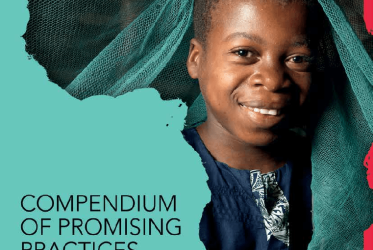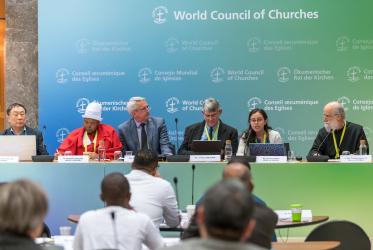This document is also available in Arabic (pdf), French, German, Spanish and Portuguese.
So let us not grow weary in doing what is right, for we will reap at harvest time, if we do not give up.
Galatians 6:9)
Dear brothers and sisters in Christ,
We, as members of the central committee of the World Council of Churches (WCC) and the ecumenical partners present, write to you as fellow pilgrims in our journey for justice and peace. During our prayerful deliberations in our meeting in Trondheim, Norway, we reaffirmed with joy that God’s love is for every person, regardless of HIV status. We were reminded of the depth and breadth of the churches’ response to HIV since the beginning of the pandemic and affirm that we journey together with people living with HIV in our faith communities and beyond. We are urged by the love of Christ to step beyond what is comfortable or convenient, particularly when reaching out to those who live on the margins of society and our theologies.
This year is significant in the global response to the pandemic, with new Sustainable Development Goals framing international responses to the vast injustices in our communities and in the world. A new United Nations political declaration on HIV has set vital commitments for governments for an intensified effort to end AIDS. But such efforts alone are not enough.
As the World Council of Churches, with our ecumenical partners and all people of good will, we are compelled to contribute to “End AIDS by 2030”. For us this means accompanying people and communities living with, or vulnerable to HIV every day, every month, every year until AIDS has been overcome.
Remembering and reflecting
The HIV pandemic is now in its fourth decade. Since 1984 the WCC has been actively involved in responding to the pandemic, promoting reflection among member churches, providing pastoral accompaniment and empowering advocacy and action. In 1986 the WCC executive committee prophetically stated - “AIDS challenges us profoundly to be the Church in deed and in truth: to be the Church as a healing community. AIDS is heart-breaking and challenges the churches to break their own hearts, to repent of inactivity and of rigid moralisms.” They also affirmed and supported the entire medical and research community in its efforts to combat the disease.[1]
In 1996, the WCC central committee reminded churches to recognize the link between AIDS and poverty, and to promote just and sustainable development and to give special attention to situations that increase the vulnerability to AIDS. In particular, churches were asked to work with women as they seek to attain the full measure of their dignity and express the full range of their gifts. Churches were reminded to educate and involve youth and men in order to prevent the spread of HIV. Churches were also invoked to understand more fully the gift of human sexuality in the contexts of personal responsibility, relationships, family and Christian faith. The central committee asked the churches to address the pandemic of drug use and the role this plays in the spread of HIV and to develop locally relevant responses in terms of care, addiction treatment, rehabilitation and prevention.[2]
The WCC central committee meeting on 6 September 2006 in Geneva, reviewed the work of the ecumenical movement in relation to HIV and recommitted the churches to become more compassionate and competent in the response to HIV and AIDS. The WCC central committee also exhorted faith-based communities to advocate that antiretroviral treatments as well as treatment for other opportunistic infections be made available and accessible to all. The leadership of the churches were encouraged to exercise their role as advocates for just policies and to hold governments accountable to their promises.[3] This year, 2016, the ecumenical journey with HIV since 1984 has been captured in the book, Passion and Compassion, The Ecumenical Journey with HIV.
HIV has been, and continues to be, a great teacher to all sectors of society.[4] It has been widely acknowledged that the response has been like no other. People living with HIV have played a fundamental role in the response and demonstrated that the leadership and involvement of those most affected is critical in addressing root causes and implementing effective solutions. The pandemic has shed light on the multi-faceted root causes and injustices driving HIV. These include stigma, discrimination, sexual and gender-based violence, gender inequalities and abuse of power and betrayal of trust. Economic disparities promote and perpetuate an environment of social evils in which HIV transmission thrives. In the HIV response, considerable efforts have been made to focus on people and their needs, and through unprecedented collaboration across all sectors of society, there have been extraordinary results on prevention, treatment, care, and support. The pandemic has rejuvenated the appreciation that faith plays a critical role in health and healing, as well as the recognition of health as a human right.
Today, almost 16 million people are on treatment. This great success is the result of concerted efforts by all sectors and their dedication to work toward the United Nations Millennium Development Goal 6. However, the HIV pandemic is far from over.
HIV remains one of the most critical areas needing intervention today. Currently 21 million people have no access to treatment of HIV and almost half of the 37 million people living with HIV do not even know they are HIV-positive. AIDS-related illnesses are now the leading cause of death for adolescents in Africa. Cumulative AIDS-related deaths of more than 30 million grow by more than 1 million every year. In addition, more than 2 million people are newly infected annually. Of these, more than 5,000 young girls and women are infected with HIV in southern Africa every week. We are facing the catastrophe of 6 million AIDS-related orphans, and this figure is growing. Despite all the medical advances in prevention of mother to child transmission, 220,000 children became newly infected in 2014. Children living with HIV have far less access to treatment than adults. Further evidence shows that globally, in 2013, 1.6 million people living with HIV were affected by humanitarian emergencies, particularly violence and conflict, with more than 80% of those affected in sub-Saharan Africa. These statistics, which carry untold stories of loss, pain and incredible hardship, are intolerable and demand a faithful and sustained response from the faith community.
Since the beginning of the pandemic, we acknowledge that some faith-based responses - in common with reactions in the society in general - have been counter-productive to the response by exacerbating stigma, fostering misinformation, and being silent on issues of vulnerability. Yet we also acknowledge that churches and their health-related services have provided compassionate care, treatment and support, often among the poor and most vulnerable. Over the years, WCC member churches, their theological institutions and ecumenical partners have also provided vital leadership in contextual theological and biblical reflections, production and distribution of theological literature, liturgies and manuals. Through their multi-faceted response, churches have proclaimed that HIV is not just a medical issue. Rather it is a social reality that demands in-depth biblical and theological grounding and life-giving theologies embodying justice, healing, peace and fullness of life.
The ecumenical movement has been committed to and continues to nurture a full spectrum of engagement with HIV, ranging from accompaniment, reflection, action and advocacy. Two critically important ecumenical initiatives of the WCC are the Ecumenical Advocacy Alliance (EAA since 2000) and the Ecumenical HIV and AIDS Initiatives and Advocacy (EHAIA since 2002).
The WCC-EHAIA has focused on accompaniment and capacity building. It seeks to promote HIV competence and advocacy among churches and works with theological institutions to integrate HIV into theological curricula. It produces theological literature which promotes life-affirming theologies, addresses the root causes of vulnerability to HIV including gender inequalities, sexual and gender-based violence, and promotes intergenerational dialogue on sex and sexuality. The use of contextual Bible studies has been a key methodology.
The WCC-EAA is an international network of churches and church-related organizations committed to campaigning together on common concerns. HIV was identified at its founding as one of the two pressing issues around which to do global advocacy. The campaign on HIV, called “Live the Promise”, addresses stigma and discrimination, advocates universal access to treatment, tackles political and legal barriers that limit access and deny rights for people living with HIV, promotes sufficient and sustainable resourcing, and encourages accountability of governments and churches. The alliance equips churches and ensures that they have the much-needed capacity to undertake this advocacy.
The ecumenical movement also ensured the greater and meaningful participation of people living with HIV in all HIV-related discussions and policy development and programme implementation. WCC developed a workplace policy in 2005, to assist member churches and ecumenical organizations to update their polices to ensure that people living with HIV are protected in institutions associated with churches and related organizations.[5] Recognizing the need and importance of people living with HIV to develop their own organizations, caucuses and networks – both in the secular and the religious contexts the ecumenical movement accompanied the formation and development of the African Network of Religious Leaders Living with or Personally Affected by HIV and AIDS (ANERELA+), and later the International Network of Religious Leaders Living with or Personally Affected by HIV (INERELA+). WCC also developed critical background information and guidelines for member churches and ecumenical organizations to equip them for developing partnerships with networks of people living with HIV.[6]
Call to action
It is vital that in the coming years the WCC member churches and their ecumenical partners increase their efforts to defeat the root causes of the transmission of HIV and AIDS and continue their, advocacy, accompaniment and spiritual support of people living with HIV. Since the churches were part of the process of articulating the Sustainable Development Goals, adopted in September 2015, a clear map has been charted by the United Nations to reach the end of AIDS by 2030. To achieve this, interim goals have been set for 2020. These goals include that at least 90% of people living with HIV know their HIV status; 90% of those who know their status have access to treatment; and 90% of those on treatment have an undetectable viral load – meaning there is virtually no risk of HIV transmission. Consequently, the scale up of service in the next four years is critical. Without the significant support and mobilization of the faith community, this will not be achieved.
The international community, acknowledging the critical role of the faith response, has called upon faith communities to respond with a renewed sense of urgency. As people of faith, we are also called by God to facilitate “life in abundance” for all God’s people. We are compelled by our commitment to God and God’s people to heed these calls.
On our Pilgrimage of Justice and Peace, we call upon WCC member churches, ecumenical partners, and people of goodwill to:
Lead by example:
In getting tested
In seeing God in the other and particularly in the people on the margins of society
In living lives which respect the dignity of the weak and vulnerable
In creating safe spaces of grace in our churches and communities where people will feel welcomed, protected, affirmed and accepted
By working closely with Christian health care providers
Provide for those in need by:
Facilitating knowledge and the environment for people of all ages to protect themselves from infection
Offering comprehensive care which includes pastoral, medical, spiritual and nutritional support
Making our health care and educational facilities welcoming and safe spaces for those living with and vulnerable to HIV
Use our prophetic voice by:
Speaking with and for those suffering injustice and exclusion
Speaking out against stigma and discrimination at every level of society, including, our own churches
Promoting theology and church practice that affirms a good and holistic understanding of sexuality and human relations.
Speaking against laws which create vulnerability to HIV
Holding governments accountable to the sustainable development goals and the commitments made in the 2016 United Nations political declaration on HIV
Advocating for expanded access to comprehensive HIV prevention, treatment, care and support
Challenging corporations and industry to operate morally by enabling access to affordable, quality diagnostics and medication for all.
We commit to these actions as individuals in the WCC central committee and the ecumenical partners present, in prayerful reliance on the wisdom and the strength of the God of Life, and we ask you to join us in this commitment. “We are a fellowship on the move, a community of pilgrims. We journey together towards life in all its fullness. We pray for God’s guidance and inspiration, so that our pilgrimage will open us to one another through dynamic and creative interaction for justice. God of life, lead us to be living instruments of your justice and peace! ”[7]Trondheim 28 June, 2016
The Central Committee of the World Council of Churches
***
[1] “AIDS and the Churches” WCC Executive Committee’s statement, Reykjavik, Iceland 15-19 September 1986 (www.oikoumene.org/en/resources/documents/executive-committee/1986/aids-and-the-churches)
[2] ‘The Impact of HIV/AIDS and the Churches' Response, 30 September 1996, statement adopted by the WCC central committee on the basis of the WCC consultative group on AIDS study process.
[3] WCC Central Committee, 06 September 2006, Statement on churches' compassionate response to HIV and AIDS (https://www.oikoumene.org/en/resources/documents/central-committee/2006/report-on-public-issues)
[4] Lessons learned from HIV have been invaluable in providing tools to address Ebola.
[5] Towards a policy on HIV/AIDS, WCC, 2006, http://tinyurl.com/gqy9gk5.
[6] Guidelines: Partnerships between Churches & People Living with HIV/AIDS Organizations, WCC, 2005, http://tinyurl.com/zaqg6zv
[7] An Invitation to the Pilgrimage of Justice and Peace, Central Committee, 08 July 2014 (http://www.oikoumene.org/en/resources/documents/central-committee/geneva-2014/an-invitation-to-the-pilgrimage-of-justice-and-peace)





